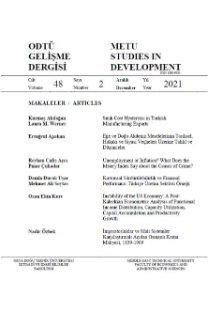The role of the state in escaping the middle-income trap: the case for smart industrial policy
Orta gelir tuzağından kurtulma sürecinde devletin rolü: Akıllı sanayi politikası gerekçesi
___
- AGGARWAL, V. and EVENETT, S. (2010), "Financial Crisis, 'New' Industrial Policy, and the Bite of Multilateral Trade Rules", Asian Economic Policy Review, 5, 221-244.
- AIYAR, S. and DUVAL, R. (2013), "Growth Slowdowns and the Middle-Income Trap", WP 13/71, International Monetary Fund.
- BESLEY, T. and PERSSON, T. (2011), Pillars of Prosperity, Princeton University Press.
- BLUSTEIN, P. (2001), The Chastening: Inside the Crisis that Rocked the Global Financial System and Humbled the IMF, Public Affairs, New York.
- BRESSER-PEREIRA, L.C. and PAULO G. (2008) "Foreign Savings, Insufficiency of Demand, and Low Growth", Journal of Post Keynesian Economics, 30 (3), Spring 2008: 315-334.
- BRESSER-PEREIRA, L. C., J. L. OREIRO and N. MARCONI (2014), Developmental Macroeconomics. London: Routledge.
- CHERIF, R. and HASANOV, F. (2015), "The Leap of the Tiger: How Malaysia Can Escape the Middle- Income Trap", IMF WP 15/131, Washington DC.
- ERGIN, I. (2015), "Breaking Out of the Middle-Income Trap: Assessing the Role of Structural Transformation", MSc dissertation, Department of International Development, LSE.
- FAGERBERG, J., SRHOLEC, M. and KNELL, M. (2007), "The Competitiveness of Nations: Why Some Countries Prosper While Others Fall Behind", World Development 35 (10), 1595-1620.
- FELIPE, J.(2012), "Tracking the Middle-Income Trap", Levy Economic Institute at Bard College, SSRN Electronic Journal, doi:10.2139/ssm204.9330.
- FISCHER, A. (2015), "The End of Peripheries?, Forum 2015, Development and Change, July.
- GILL, I. and KHARAS, H. (2007), An East Asian Renaissance, World Bank.
- IM, F. and ROSENBLATT, D. (2013), "Middle-Income Traps", Policy Research Working Paper 6594, World Bank.
- IMBS, J. and WACZIARG, R. (2003), "Stages of Diversification", American Economic Review 93 (1), 63- 86.
- KANCHOOCHAT, V. and INTARAKUMNERD, P. (2014), "Tigers Trapped: Tracing the Middle-Income Trap through the East and Southeast Asian Experience", WP 04/2014, Berlin Working Papers on Money, Finance, Trade and Development.
- KAPLINSKY, R. (2005), Globalization, Poverty and Inequality, Polity Press, Cambridge.
- LIN, J. and CHANG, H.J. (2009), "Should Industrial Policy in Developing Countries Conform to Comparative Advantage or Defy It?", Development Policy Review, 27 (5), 483-502.
- LIN, J. Y. (2012), "From Flying Geese to Leading Dragons: New Opportunities and Strategies for Structural Transformation in Developing Countries", Global Policy, 3 (4).
- MANKIW, G. (2006), "Repeat After Me", Wall Street Journal, 3 January.
- MAZZUCATO, M. (2013) The Entrepreneurial State, Anthem Press.
- MILANOVIC, B. (2005), Worlds Apart, Princeton University Press.
- OECD (2012) Looking to 2060: Long-term Global Growth Prospects, Paris.
- OHNO, K. (2009), "The Middle Income Trap: Implications for Industrialization Strategies in East Asia and Africa", GRIPS, National Graduate Institute for Policy Studies, Tokyo.
- PAUS, E. (2014), "Latin America and the Middle Income Trap", SSRN Electronic Journal, June, doi:10.2139/ssm.2473823.
- PRITCHETT, L. and SUMMERS, L. (2014), "Asiaphoria Meets Regression to the Mean", NBER Working Paper 20573, October.
- ROBERTSON, P. and YE, L. (2013), "On the Existence of a Middle Income Trap", SSRN Electronic Journal.
- ROLL, M. (ed.) (2014), The Politics of Public Sector Performance: Pockets of Excellence in Developing Countries. London: Routledge.
- UNCTAD (United Nations Conference on Trade and Development), (2014), Trade and Development Report, Geneva.
- WADE, R.H. (1990a), "Industrial Policy In East Asia: Does It Lead or Follow the Market?", in G. Gereffi and D. Wyman (eds), Manufacturing Miracles. Princeton University Press.
- WADE, R.H. (1990b) (and 2004), Governing the Market, Princeton University Press.
- WADE, R.H. (1991), "How to Protect Exports from Protection: Taiwan's Duty Drawback Scheme", The World Economy, 14(3), 299-309.
- WADE, R.H. (1992), "East Asia's Economic Success: Conflicting Perspectives, Partial Insights, Shaky Evidence", World Politics, 44, 270-320.
- WADE, R.H. (1993), "Managing trade: Taiwan and South Korea as a Challenge to Economics and Political Science," Comparative Politics, 25(2), 147-67. Reprinted in The Political Economy of East Asia, (ed.) John Ravenhill, Edward Elgar, 1994.
- WADE, R.H. (1998a), "From 'Miracle' to 'Cronyism': Explaining the Great Asian Slump", Cambridge Journal of Economics, 22 (6), 693-706
- WADE, R.H. (1998b), "The Battle Over Capital Flows", Foreign Policy, December, 41-54.
- WADE, R.H. (2003), "What Development Strategies are Viable for Developing Countries? The World Trade Organization and the Shrinking of 'Development Space'", Review of International Political Economy, 10 (4), 621-644.
- WADE, R.H. (2011), "Why Justin Lin's Door-Opening Argument Matters for Development Economics", Global Policy, 2 (1), 115-116
- WADE, R.H. (2013a), "The Art of Power Maintenance: How Western States Keep the Lead in Global Organizations", Challenge 56, (1), 5-39.
- WADE, R.H. (2013b), "Protecting Power: Western States in Global Organizations", in D. Held and C. Roger, Global Governance At Risk, Polity, Cambridge.
- WORLD BANK (2013), China 2030: Building a Modern, Harmonious, and Creative Society, World Bank.
- YUSUF, S. and NABESHIMA, K. (2009), Tiger Economies Under Threat, World Bank.
- ISSN: 1010-9935
- Yayın Aralığı: 3
- Başlangıç: 2018
- Yayıncı: ODTÜ İİBF
The world into the 21st century: Globalization, market capitalism and sustainability
Do regional trade agreements actually increase Turkey's foreign trade?
Merve Mavuş KÜTÜK, ELİF AKBOSTANCI ÖZKAZANÇ
Friedrich List & Joseph Schumpeter: Strange bedfellows in the pedigree of (development) economics?
Türkiye'de kredi genişlemesinin sektörel dönüşüm üzerine etkisi
Raif CAN, Hüseyin GÜNAY, Mustafa KILINÇ
Dynamic analysis of employment and domestic value added generated by foreign demand in Turkey
Sevinç MIHÇI, Arzu Akkoyunlu WİGLEY, BAŞAK DALGIÇ
Do regional trade agreements actually increase Turkey's foreign trade?
Elif AKBOSTANCI, Merve Mavuş KÜTÜK
The effect of the global financial crisis on household income, inequality and poverty in Turkey
Sırma Demir ŞEKER, MELTEM DAYIOĞLU TAYFUR
Osmanlı devleti ve Avrupa devletlerinde tağşişler ve nedenleri
KAMİL KIVANÇ KARAMAN, Şevket PAMUK
The role of the state in escaping the middle-income trap: the case for smart industrial policy
